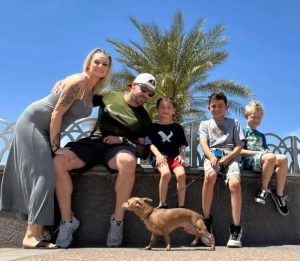Turning a Fall Into a Leap: Mark Clark’s Persevere Story
Several years ago, Mark Clark was living a certain version of success. Every aspect of his life had locked into place after he and his partner moved to Scottsdale, Arizona, where he had opened a health club. There, he could further his career as an award-winning private personal trainer without having to travel to clients, as he had been doing until then. With two children, a mortgage, luxury sports cars, and a sunny marriage, Mark was easy to envy; his life had the sheen of completeness, as if there were nothing left to want.
In 21st century America, however, it is possible to fall very far and very fast. Mark discovered that his partner was addicted to drugs, and in trying to help her, his life unraveled: Mark lost her, lost custody of his children, and soon his business foundered. As a result he turned to drugs, alcohol, and gambling himself, using everything from petty crime to breaking and entering to sustain his addictions.
He was coping by not coping: by turning toward things which promised relief–easy money, numbing thrills–without healing. It was only a matter of time, he says, before he ended up incarcerated. The result was a four-and-a-half year prison sentence, which he was to spend at Arizona State Prison–Kingman, in the deserts of Mohave County.
“I was super depressed during my time at Kingman,” Mark says. “I thought: ‘There’s no way of recouping what I lost, no way of fixing what I’ve damaged.’ I’d had everything before, but now I had nothing. I would fall asleep praying not to wake up.”
 Then one morning, he woke up to a “chrono”–a slip of paper with a place and time–that said “Persevere” on it. “So I saw that word, ‘Persevere,’ and I thought I’d go to the meeting. I didn’t know much about it. When I got there, sure enough, there was Sean Hosman, speaking to about 100 of us inmates.”
Then one morning, he woke up to a “chrono”–a slip of paper with a place and time–that said “Persevere” on it. “So I saw that word, ‘Persevere,’ and I thought I’d go to the meeting. I didn’t know much about it. When I got there, sure enough, there was Sean Hosman, speaking to about 100 of us inmates.”
Though Mark knew next to nothing about coding or engineering, he needed something to occupy him–to quiet the voice in his mind that asked not to wake up–and so he applied and interviewed for the Persevere program.
After Mark was accepted to Persevere, along with 23 other inmates, the Department of Corrections moved him to the Whetstone Unit in Tucson. “It was an exciting moment for all of us,” Mark says. “Those 24 of us became friends. I still talk to ten or so of the individuals from that cohort. We were taking a chance together. We were embarking on an adventure. It gave us something to work toward. And it gave me something to live for.”
Transferred to a new facility, Mark now had to learn coding from the ground up, which he admits was a significant uphill climb. “It’s not simple by any means,” he says. “Some guys get it way better than I did at first. Six months in I was thinking, ‘My brain just doesn’t work this way.’ But I also have this stubbornness about me where I refuse to accept that I don’t know something, that I can’t do something.”
With class from eight in the morning to three in the afternoon Monday through Friday, he would study in his cell whenever he could. Over time he gained a solid enough hold on coding that he became a teacher’s aide during his last year as an inmate. “After finishing my capstone project and graduating, I was happy to be able to teach new students what I wish I’d known when I first started.” He was no longer so depressed: with Persevere having opened up a new set of skills, Mark even began to heal the wounds that had sent him to prison initially.
“In prison, I made a commitment,” he says. “At first I had given up on life and was suffering tremendously. When I found Persevere, or Persevere found me, I said to myself, ‘If this is how it’s going to be I’m going to get everything I can out of it.’ I made that promise to Persevere and myself, and to the extent I could, I followed through on it. But then when I got out in fall 2021, life hit me pretty quickly.”
With a loan of a few hundred dollars from his brother and a cell phone, Mark made a second go at life in Arizona. He washed dishes for restaurants as a temp, taking unreliable public transport to and from jobs for two and a half months. Yet inside this former trainer, busing back and forth from kitchen shifts, lived an engineer–a rare find in this corner of the desert. Still, in the blind rush of working to make bills, he couldn’t find an opportunity.
Then Mark re-connected with Sean Hosman, Founder of Persevere and himself a former inmate. Sean offered Mark an opportunity as a web developer with Banyan Labs. As soon as Mark started, he was firing on all cylinders, grateful for the chance to pursue a stable and engaging line of work.
He scheduled meetings, helped train developers, and contributed to projects in multiple departments. After some time, Mark convinced Banyan Labs to give him a chance as Director of Business Development. In that role he focused on honing the brand, widening Banyan’s reach and influence, and implementing its growth strategy.
After his time at Banyan Labs, Mark moved to the Next Chapter Project–“the perfect next step,” as he describes it. Next Chapter, a nonprofit incubated by Slack and sponsored by John Legend, partners with tech firms to provide meaningful career opportunities through apprenticeships. Mark received an apprenticeship with Gusto, a payroll platform that processes about $167 billion per year. He’s just had his six-month review as an intern: In some areas, Mark is meeting or exceeding Level 2 engineering expectations. “This is what I’ve been fighting for since I started with Persevere in 2019,” he says.
“For four years I set out to be an engineer and now that’s what I am. Working with other engineers, I’ve faced down a huge inferiority complex, impostor syndrome, and to know that other professionals think, ‘This person knows what he’s doing, he’s doing a good job, we have faith in him, he’s an engineer, he’s good,’ it’s life changing.”
What made the difference? What made it possible for him to become who he is today, after falling so far? “My downfall was inevitable,” he says. “It didn’t matter if I had $500,000 or $3,000,000, it was more money to do bad things with. Then you get to prison and in prison, you realize the damage you’ve already done and suffer the new damage of your sentence. What Persevere did is say: ‘Here’s this opportunity for you to have a second chance,’” something that Mark’s society–our society–often fails in, even, or especially, after the rehabilitation of prison. 
Persevere connected Mark and others in his class with engineers on the “outside”: folks from Amazon, engineering directors from Microsoft, professors at University of Illinois-Chicago. Having professionals who believed in him, who affirmed that he was on the right track, helped Mark see value in himself, which in turn helped him push onward when the path was unclear.
Persevere gave him not only a set of skills but a point of view: that he was not out of road, that the path was ongoing. What felt for a time like the end–the plummet from comfortable business owner to flat-broke inmate, praying not to wake up–he started to see, instead, as a beginning. His gutting fall from success became a leap into the unknown.

Alec Niedenthal is a writer living in Brooklyn, New York. Born in 1990 in Florida, raised in Birmingham, Alabama, he received his MFA in Fiction from Brown University.
View all posts




